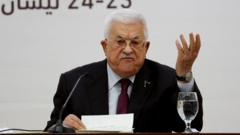As Israel and Hamas resume talks in Qatar to finalize a cease-fire agreement, hopes rise for an end to the worsening humanitarian crisis in Gaza and the release of hostages.
Israel and Hamas Reportedly Close to Cease-Fire Deal

Israel and Hamas Reportedly Close to Cease-Fire Deal
Negotiations mediated by regional allies show promise after prolonged conflict in Gaza
As tensions in the Middle East escalate, new developments suggest that Israeli and Hamas representatives are nearing a consensus on a cease-fire and the potential for hostages' release. On Tuesday, negotiations facilitated by Qatar, Egypt, and the United States hinted at progress after previous efforts faltered.
According to sources familiar with the talks, discussions aim to iron out remaining details while addressing fundamental issues that have historically impeded agreements. Specifically, the focus is both on the implementation of potential terms and on reassuring families of hostages taken over a year ago. The conflict's toll on Gazans, particularly those in displacement camps facing ongoing Israeli airstrikes, complicates the situation further.
Despite recent optimism, the history of negotiations tells a story of fluctuating hope and disappointment. Previous attempts to secure a cease-fire have often ended with accusations and renewed hostilities, leaving both sides wary of each other. Notably, this latest attempt draws inspiration from proposals considered in earlier months, reflecting a possible shift toward a more viable path of resolution than seen in past engagements.
The stakes are notably high for both parties: for Gazans hoping for relief from oppressive conditions, and for Israeli families desperately seeking to ascertain the fate of their abducted relatives. The outcome of the current discussions will have far-reaching implications for both the immediate situation in Gaza and broader regional stability.
With this delicate balance in play, the international community watches closely as the talks progress, hoping that they will yield results that enable both parties to move toward a more peaceful state.
According to sources familiar with the talks, discussions aim to iron out remaining details while addressing fundamental issues that have historically impeded agreements. Specifically, the focus is both on the implementation of potential terms and on reassuring families of hostages taken over a year ago. The conflict's toll on Gazans, particularly those in displacement camps facing ongoing Israeli airstrikes, complicates the situation further.
Despite recent optimism, the history of negotiations tells a story of fluctuating hope and disappointment. Previous attempts to secure a cease-fire have often ended with accusations and renewed hostilities, leaving both sides wary of each other. Notably, this latest attempt draws inspiration from proposals considered in earlier months, reflecting a possible shift toward a more viable path of resolution than seen in past engagements.
The stakes are notably high for both parties: for Gazans hoping for relief from oppressive conditions, and for Israeli families desperately seeking to ascertain the fate of their abducted relatives. The outcome of the current discussions will have far-reaching implications for both the immediate situation in Gaza and broader regional stability.
With this delicate balance in play, the international community watches closely as the talks progress, hoping that they will yield results that enable both parties to move toward a more peaceful state.



















